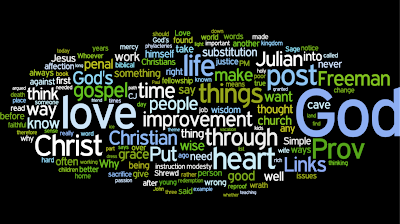As promised yesterday, here is what amounts to a super-brief (again) presentation of the biblical support for penal substitution. Despite what the critics will posit, it's not new, it's not western, it's not because of Augustine, and it's not even modern; penal substitution is biblical.
We'll borrow our definition of 'penal substitution' from Wayne Grudem (579):
Christ's death was 'penal' in that he bore a penalty when he died. His death was also a 'substitution' in that he was a substitute for us when he died.
The biblical support for penal substitution is so prevalent throughout the storyline of redemptive-history that it is hard to express with concision. Our approach will be to sketch a few examples of the foreshadowing of Christ’s penal substitutionary work from the OT, and then examine the corroborating evidence from the NT.
The penal substitution of Christ is foreshadowed at least as early as Genesis 22. In this story Abraham is called to offer his son Isaac as a sacrifice to God. When Abraham demonstrates his faith in God by preparing to offer his own sin, God intervenes—surprisingly and miraculously—by providing a substitute; a ram was sacrificed in the place of Isaac, so that he could live. Again, in the miraculous redemptive work of God in saving Israel from their captivity in Egypt, penal substitution is prefigured. On the night of the Passover, the people are to slaughter a spotless lamb (just enough for each household). During the night, the Destroyer would come to take the lives of all the firstborn sons in the land. Only those who were in the homes where the lamb had been slaughtered were preserved; the lamb had died in place of the son. The book of Leviticus (chs. 4-7 indicate specifically the nature of the cultic rites) teaches that where sin has occurred, whether intentional or not, a death must result. Here it is made clear that an animal had to die in place of the human who had sinned, and therefore deserved death. The prophetic writings reflect back to the Israelites the nature of that law, as well as looking forward to the coming of Christ, which is why Isaiah 52-53 portrays the penal substitutionary work of Christ perhaps more clearly than anywhere else in the OT. There it is put bluntly and undeniably: “He was wounded for our transgressions; he was crushed for our iniquities; upon him was the chastisement that brought us peace, and with his stripes we are healed” (Isaiah 53:5).
The NT evidence is no less scarce. In fact, one approach to displaying the NT evidence is by a simple study of the preposition
huper (ὑπερ). It has been argued that
huper has a simple meaning of “for one’s benefit.” When studied in individual passages, however, it has been demonstrated that there is a much stronger meaning contained in the word, which may be explained as “for one’s benefit, by being in one’s place.” This stronger meaning is evinced in the following passages. In John 10:11, Jesus teaches that he is the Good Shepherd who lays down his life
for the sheep. The very nature of the metaphor requires the stronger meaning. Similarly, in Galatians 3:13 we are told that Christ redeems us from the curse of the law by becoming a curse
for us. This simply cannot mean only “for our benefit”; in this instance it is clear that he becomes the curse in our place, that we might benefit. Again, 1 Peter 3:18 states that the righteous one suffered
for the unrighteous, which clearly indicates that we receive the benefit only by having a substitute. Aside from the meaning of
huper, a plain reading of passages like 2 Corinthians 5:21 (where Christ was “made to be sin”
on our behalf) and 1 Peter 2:24 (where Christ “bore our sins in his body”) militate against any argument that penal substitution is unbiblical or unnecessary.
.jpg)
















